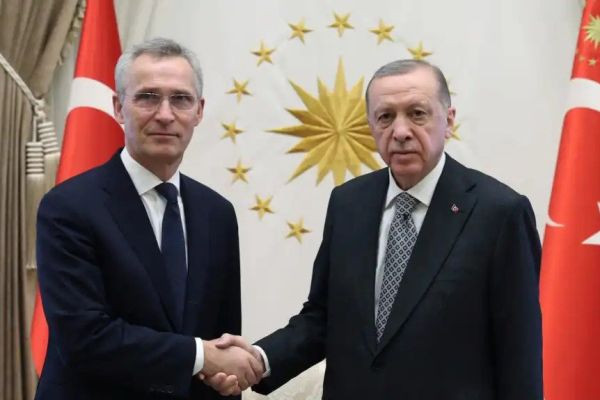Introduction:
The complex dynamics between nations often give rise to speculation and interpretation, especially when it comes to international agreements and geopolitical maneuvering. Recently, Russia's decision to withdraw from a grain deal has sparked rumors that it could be a retaliatory measure against Turkey's participation in NATO's expansion plans. However, Turkey's presidential adviser has come forward to dismiss these claims, emphasizing that the grain deal exit should not be viewed as a response to NATO expansion. In this article, we will delve into the details of this situation and shed light on the adviser's assertions.
Background:
Turkey, a significant regional player straddling Europe and Asia, has been a NATO member since 1952. Over the years, the alliance has expanded to include additional countries, and Turkey has been actively involved in discussions related to NATO's expansion plans. Meanwhile, Russia, Turkey's neighbor to the north, has been monitoring these developments with keen interest.
Russia's Grain Deal Exit:
In recent months, Russia and Turkey have been engaged in a grain trade agreement, which has been mutually beneficial for both nations. However, Russia's unexpected decision to withdraw from the deal has led to speculation that it could be a calculated move in response to Turkey's NATO involvement.
Turkey's Presidential Adviser's Statement:
Turkey's presidential adviser has refuted these claims, asserting that Russia's decision to exit the grain deal is not linked to any retaliation against Turkey's participation in NATO expansion. The adviser emphasized that the grain deal was a commercial agreement, and any insinuation of political motivations behind the withdrawal is baseless.
Reasons Behind Russia's Grain Deal Exit:
According to the presidential adviser, the primary reasons for Russia's withdrawal from the grain deal are rooted in market dynamics and domestic considerations. It is suggested that Russia's decision was driven by factors such as domestic grain supply and demand, price fluctuations, or strategic realignments in their export priorities.
Maintaining Bilateral Relations:
The adviser emphasized the significance of maintaining positive bilateral relations between Turkey and Russia, highlighting the extensive economic and political ties that exist between the two countries. Both nations have a long history of cooperation in various sectors, including energy, tourism, and defense. The presidential adviser reiterated Turkey's commitment to nurturing these relationships and addressing any concerns through diplomatic channels.
Separating Trade and Geopolitics:
It is essential to recognize that trade agreements between nations should be evaluated on their own merits and not conflated with larger geopolitical developments. While international relations are undoubtedly intertwined, it is crucial to approach each issue with objectivity and avoid jumping to conclusions or attributing ulterior motives without concrete evidence.
Recent News
Turkey’s chief presidential adviser told CNN’s Eleni Giokos that Russia’s withdrawal from the Black Sea grain deal was not in retaliation to Turkey's support for Sweden’s bid to join NATO.
“We have been as a NATO ally, so very open in our relationship with the Russian Federation,” Akif Cagatay Kilic said, responding to a question about whether Sweden’s membership for NATO expansion created some friction between the two countries and if Russia’s pulling back from the grain deal is some form of retaliation toward Turkey.
“We are very closely working together with all the parties there, but also with the Russian Federation, and I don't believe that is that there's friction regarding the NATO Summit," he added.
Some background: Turkey approved Sweden's bid to join the military alliance on July 11, which made the alliance complete a historic expansion in response to Russia's invasion of Ukraine. Turkey had previously spent months blocking Sweden's application, accusing it of hosting Kurdish militants. As one of NATO’s 31 members, Turkey has a veto over any new country joining the group.
The movement on NATO’s accession comes after months of opposition and demands from Ankara. Turkey claimed that Sweden allows members of recognized Kurdish terror groups to operate, most notably the militant Kurdistan Workers’ Party (PKK). Turkey had also accused Swedish officials of complicity in Islamophobic demonstrations, such as the burning of the Quran.
Conclusion:
In the realm of international affairs, it is common for events to be subject to different interpretations and speculations. In the case of Russia's grain deal exit, Turkey's presidential adviser has firmly denied any connection to Turkey's involvement in NATO expansion. Instead, the adviser has highlighted market dynamics and domestic considerations as the key factors behind Russia's decision. As observers and analysts, it is imperative to assess situations based on factual information and avoid sensationalizing events without solid evidence. By maintaining a balanced perspective, we can foster better understanding and promote constructive dialogue between nations.









